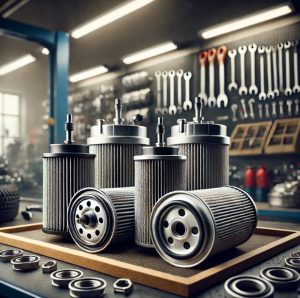When it comes to maintaining your vehicle’s engine performance, fuel filters often go unnoticed. However, these little components play a vital role in ensuring that the fuel your engine uses is clean and free of contaminants. Understanding their function and importance can help you avoid costly repairs and keep your vehicle running efficiently.
What is a Fuel Filter?

A fuel filter is a small but essential part of a car’s fuel system that prevents dirt, rust, and other debris from entering your engine. Located between the fuel tank and the engine, the filter removes contaminants from the fuel before it reaches the engine’s internal components.
Why is it Important?
- Engine Protection: By removing harmful particles, the fuel filter prevents them from damaging delicate engine parts, such as fuel injectors and the fuel pump, ensuring long-term engine health.
- Improved Performance: A clean fuel filter helps maintain the proper flow of fuel to the engine, contributing to better fuel efficiency and smoother performance.
- Prevent Clogging: Over time, fuel filters can become clogged with dirt and debris, leading to a decrease in engine power and efficiency. Regularly replacing your fuel filter ensures this doesn’t happen.
How Often Should You Replace It?
Fuel filters typically need to be replaced every 30,000 to 40,000 miles, but this can vary depending on your vehicle’s make and model. Always refer to your vehicle’s owner’s manual for the manufacturer’s recommended maintenance schedule.
Signs That Your Fuel Filter Needs Replacing:
- Engine Misfires: If your engine is struggling to start or stalls frequently, it could be due to a clogged fuel filter.
- Poor Acceleration: Difficulty accelerating or a noticeable delay in response may be a sign that the fuel flow is restricted.
- Reduced Fuel Efficiency: A compromised fuel filter can result in poor fuel economy due to inefficient fuel delivery.
Conclusion
Fuel filters may not get the attention they deserve, but they are crucial in keeping your engine running smoothly and efficiently. Regular maintenance and timely replacements can prevent costly repairs down the road and ensure that your vehicle remains in top condition for years to come.